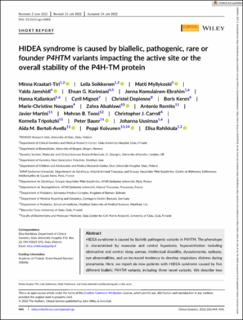| dc.contributor.author | Kraatari-Tiri, Minna | |
| dc.contributor.author | Soikkonen, Leila | |
| dc.contributor.author | Myllykoski, Matti Aukusti | |
| dc.contributor.author | Jamshidi, Yalda | |
| dc.contributor.author | Karimiani, Ehsan G. | |
| dc.contributor.author | Komulainen-Ebrahim, Jonna | |
| dc.contributor.author | Kallankari, Hanna | |
| dc.contributor.author | Mignot, Cyril | |
| dc.contributor.author | Depienne, Christel | |
| dc.contributor.author | Keren, Boris | |
| dc.contributor.author | Nougues, Marie-Christine | |
| dc.contributor.author | Alsahlawi, Zahra | |
| dc.contributor.author | Romito, Antonio | |
| dc.contributor.author | Martini, Javier | |
| dc.contributor.author | Toosi, Mehran B. | |
| dc.contributor.author | Carroll, Christopher J. | |
| dc.contributor.author | Tripolszki, Kornelia | |
| dc.contributor.author | Bauer, Peter | |
| dc.contributor.author | Uusimaa, Johanna | |
| dc.contributor.author | Bertoli-Avella, Aida M. | |
| dc.contributor.author | Koivunen, Peppi | |
| dc.contributor.author | Rahikkala, Elisa | |
| dc.date.accessioned | 2023-02-28T14:56:54Z | |
| dc.date.available | 2023-02-28T14:56:54Z | |
| dc.date.created | 2022-10-27T14:49:31Z | |
| dc.date.issued | 2022 | |
| dc.identifier.issn | 0009-9163 | |
| dc.identifier.uri | https://hdl.handle.net/11250/3054757 | |
| dc.description.abstract | HIDEA syndrome is caused by biallelic pathogenic variants in P4HTM. The phenotype is characterized by muscular and central hypotonia, hypoventilation including obstructive and central sleep apneas, intellectual disability, dysautonomia, epilepsy, eye abnormalities, and an increased tendency to develop respiratory distress during pneumonia. Here, we report six new patients with HIDEA syndrome caused by five different biallelic P4HTM variants, including three novel variants. We describe two Finnish enriched pathogenic P4HTM variants and demonstrate that these variants are embedded within founder haplotypes. We review the clinical data from all previously published patients with HIDEA and characterize all reported P4HTM pathogenic variants associated with HIDEA in silico. All known pathogenic variants in P4HTM result in either premature stop codons, an intragenic deletion, or amino acid changes that impact the active site or the overall stability of P4H-TM protein. In all cases, normal P4H-TM enzyme function is expected to be lost or severely decreased. This report expands knowledge of the genotypic and phenotypic spectrum of the disease. | en_US |
| dc.language.iso | eng | en_US |
| dc.publisher | Wiley | en_US |
| dc.rights | Navngivelse 4.0 Internasjonal | * |
| dc.rights.uri | http://creativecommons.org/licenses/by/4.0/deed.no | * |
| dc.title | HIDEA syndrome is caused by biallelic, pathogenic, rare or founder P4HTM variants impacting the active site or the overall stability of the P4H-TM protein | en_US |
| dc.type | Journal article | en_US |
| dc.type | Peer reviewed | en_US |
| dc.description.version | publishedVersion | en_US |
| dc.rights.holder | Copyright 2022 The Author(s) | en_US |
| cristin.ispublished | true | |
| cristin.fulltext | original | |
| cristin.qualitycode | 1 | |
| dc.identifier.doi | 10.1111/cge.14203 | |
| dc.identifier.cristin | 2065687 | |
| dc.source.journal | Clinical Genetics | en_US |
| dc.source.pagenumber | 444-450 | en_US |
| dc.identifier.citation | Clinical Genetics. 2022, 102 (5), 444-450. | en_US |
| dc.source.volume | 102 | en_US |
| dc.source.issue | 5 | en_US |

